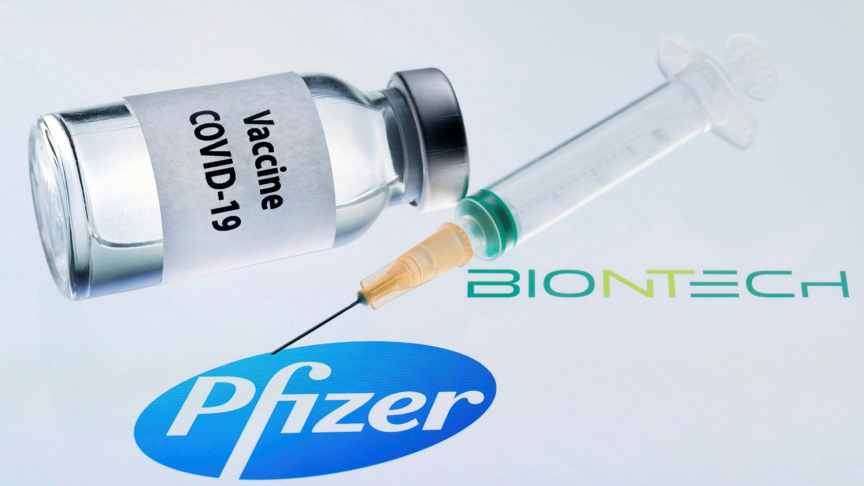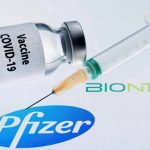A new Pfizer-funded study found that Pfizer vaccine effectiveness drops to 84% after 4 to 6 months

Last week, a new study from Israel found that the Pfizer vaccine is only 39% effective at stopping the Delta variant. A recently released report from the Israel Health Ministry showed that while the Pfizer vaccine is still 88% effective at preventing serious illness, it’s only 39% effective at preventing infection with delta variant.
Meanwhile, there is a resurgence in covid cases, hospitalizations, and deaths due to the new Delta variant causing the Centers for Disease Control and Prevention (CDC) to reverse its mask-free policy for vaccinated people.
As everyone was waiting to hear some good news on the vaccine front, today Pfizer CEO Albert Bourla shared findings from the company-funded study which showed Pfizer’s vaccine efficacy declines approximately 84 percent within four to six months.
Bourla also shared the result of the study during his appearance on a July 29 episode of CNBC’s The Exchange. Bourla said the vaccine efficacy after “four to six months was approximately 84 percent.”
According to the new Pfizer-funded study, which has not yet been peer-reviewed but was released early as a preprint on medRxiv, researchers evaluated the vaccine’s efficacy for more than 44,000 Pfizer recipients across the U.S., South Africa, and in other countries over a period of 6 months.
The study found that the vaccine was most protective between one week and two months after people received the second dose, with a 96.2 percent efficacy against infection. But the researchers also found that every two months, the effectiveness of the vaccine declines by about 6 percent. Between two to less than four months, Pfizer’s vaccine had dropped to 90.1 percent.
“The good news is that we are very, very confident that a third dose, a booster, will take up the immune response to levels that will be enough to protect against the Delta variant,” he said. According to Bourla, Pfizer plans to formally submit data to U.S. regulators about the benefits of a third COVID vaccine dose by mid-August.
So, how do you sum up the current state of the Pfizer vaccine? Former New York Time Reporter Alex Berenson said it best. Below is what he said on Twitter early this evening.
“Zero reduction in all-cause mortality.
Nonsignificant 0.01% reduction in #Covid mortality.
4x the rate of adverse events in the active arm.
~2x the rate of serious adverse events.
Declining efficacy after months.
And this data is from the COMPANY’S trial.Where do I sign up?”
Zero reduction in all-cause mortality.
Nonsignificant 0.01% reduction in #Covid mortality.
4x the rate of adverse events in the active arm.
~2x the rate of serious adverse events.
Declining efficacy after months.
And this data is from the COMPANY’S trial.Where do I sign up?
— Alex Berenson (@AlexBerenson) July 30, 2021
Below is the Abstract of the Pfizer-funded study.
Abstract
Background: BNT162b2 is a lipid nanoparticle-formulated, nucleoside-modified RNA vaccine encoding a prefusion-stabilized, membrane-anchored SARS-CoV-2 full-length spike protein. BNT162b2 is highly efficacious against COVID-19 and is currently authorized for emergency use or conditional approval worldwide. At the time of authorization, data beyond 2 months post-vaccination were unavailable. Methods: In an ongoing, placebo-controlled, observer-blinded, multinational, pivotal efficacy study, 44,165 ≥16-year-old participants and 2,264 12-15-year-old participants were randomized to receive 2 doses, 21 days apart, of 30 μg BNT162b2 or placebo. Study endpoints reported here are vaccine efficacy (VE) against laboratory-confirmed COVID-19 and safety data, both up to 6 months post-vaccination.
Results:
BNT162b2 continued to be safe and well-tolerated. Few participants had adverse events leading to study withdrawal. VE against COVID-19 was 91% (95% CI 89.0‒93.2) through up to 6 months of follow-up, among evaluable participants and irrespective of previous SARS-CoV-2 infection. VE of 86%‒100% was seen across countries and in populations with diverse characteristics of age, sex, race/ethnicity, and COVID-19 risk factors in participants without evidence of previous SARS-CoV-2 infection. VE against severe disease was 97% % (95% CI 80.3‒99.9).
In South Africa, where the SARS-CoV-2 variant of concern, B.1.351 (beta), was predominant, 100% (95% CI 53.5, 100.0) VE was observed.
Conclusion: With up to 6 months of follow-up and despite a gradually declining trend in vaccine efficacy, BNT162b2 had a favorable safety profile and was highly efficacious in preventing COVID-19. (ClinicalTrials.gov number, NCT04368728)




